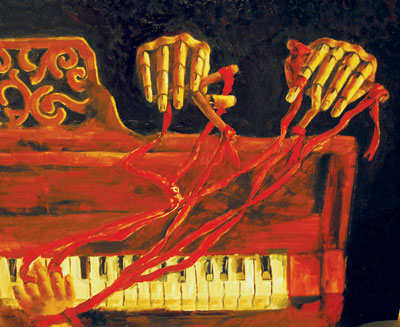All Nonfiction
- Bullying
- Books
- Academic
- Author Interviews
- Celebrity interviews
- College Articles
- College Essays
- Educator of the Year
- Heroes
- Interviews
- Memoir
- Personal Experience
- Sports
- Travel & Culture
All Opinions
- Bullying
- Current Events / Politics
- Discrimination
- Drugs / Alcohol / Smoking
- Entertainment / Celebrities
- Environment
- Love / Relationships
- Movies / Music / TV
- Pop Culture / Trends
- School / College
- Social Issues / Civics
- Spirituality / Religion
- Sports / Hobbies
All Hot Topics
- Bullying
- Community Service
- Environment
- Health
- Letters to the Editor
- Pride & Prejudice
- What Matters
- Back
Summer Guide
- Program Links
- Program Reviews
- Back
College Guide
- College Links
- College Reviews
- College Essays
- College Articles
- Back
Erlkönig by Franz Schubert
Music has the ability to express emotions and feelings without using words. “Erlkönig” is a German poem written by Johann Wolfgang von Goethe and put to music by multiple composers. Franz Schubert’s rendition of the poem in song form is one of the most notable versions of “Erlkönig.” The song follows a father who is riding to an inn with his child ill and hallucinating of the Erlöking in his arms. Goethe’s words and Schubert’s composition make you truly feel for a boy and his father through their emotional journey.
The song is in a minor key for most of the song which already tells the audience that this song isn’t going to be pleasant. The song starts with fast, frantic eighth note triplets in the right hand of the piano and accent scales in the left hand sporadically. The first character to sing is the narrator. The narrator describes a father riding late at night with his child in his arms to keep the child warm. The father is the next character to enter. The father is very clearly concerned for his young, ill child. The audience can distinctly hear the father’s feelings from where his range goes throughout the song. The more emotion the father feels, the higher and more frantic he sounds. The boy is frenetic throughout the entire piece. As the boy realizes the menacing predicament he is in, he goes up in pitch on his entrances. The Erlking, which is the English translation of Erlkönig, is the next character to enter the scene. He sings in a major key which distinctly sets him apart from the other voice parts. Major keys instill in the audience a sense of bliss and contentment. Forcing a major key into a song in a minor key would throw off the audience with a false sense of security. He describes to the young, impressionable child, in a tone that is too cordial, that he wants the child to go with him to his ominous and mysterious domain. His range doesn’t have the same pattern of increasing pitch as the intensity increases. His pattern is much more erratic than that of the other characters who tend to move in scale like steps instead of large leaps. The vocalist must get into the mind of the disturbing and eerie Erlking that is trying to lure a child to death. The Erlking eventually gives up on his pleasant persuasion and grabs the boy. Schubert ends the song with a ritardando that symbolizes the horse slowing down as the father reaches the inn. The song ends dramatically and powerfully with a separation of major phrases the narrator says by adding in chords, and with intense, drastic dynamics. The narrator sings that the father has made it to the inn and the horse triplets stop. The narrator sings “in sienen armen das kind” which translates to “and the child in his arms.” There is a soft chord for separation. Then the narrator sings “was todt” which translates to “was dead” and the song ends with two full, intense chords.
Schubert and Goethe combine to create a hauntingly enchanting song that makes you feel intensely for a child’s horrifying last moments and a father who has to watch his child die in his arms. Schubert’s composition flawlessly frames Goethe’s poem. The music adds another layer of vulnerability to the listener as the poem weaves a tragic story that doesn’t end joyfully. A father is left without his child and the listener is left with a grim feeling after the child’s death. The piece is truly remarkable in its ability to make you feel dread so intensely.

Similar Articles
JOIN THE DISCUSSION
This article has 0 comments.

I am studying to become a music teacher, and this is one of my college audition pieces. The poetry and music spoke to me in a way only music can. I have a love for dark, foreboding pieces. "Erlkönig" is such an expressive, dark song. It is one of my favorite songs I have worked on.